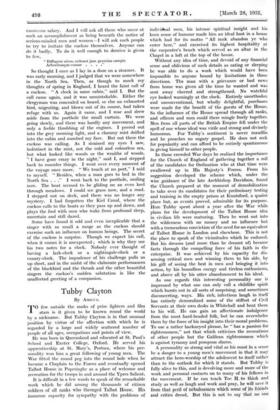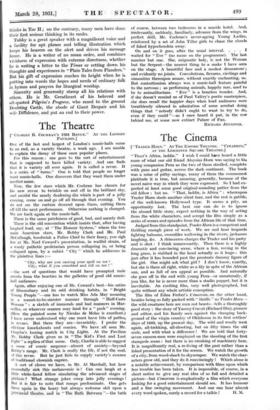Tubby Clayton
By Mucus.
110 few outside the ranks of prize fighters and film stars is it given to be known round the world by a nickname. But Tubby Clayton is in that unusual position by virtue of the affection with which he is regarded by a large and widely scattered number of people of all ages, occupations and points of view.
He was born in Queensland and educated at St. Paul's School and Exeter College, Oxford. He served his apprenticeship at St. Mary's, Portsea, where his per- sonality won him a great following of young men. The War fitted the round peg into the round hole when he became a Chaplain to the Forces and eventually opened Talbot House in Poperinghe as a place of welcome and recreation for the troops in and around the Ypres Salient.
It is difficult in a few words to speak of the remarkable work which he did among the thousands of citizen soldiers of all ranks who thronged Talbot House. His immense capacity for sympathy with the probleMs of individual men, his intense spiritual insight and his keen sense of humour made him an ideal host in a house which had for its motto "All rank abandon ye who enter here," and exercised its highest hospitality at the carpenter's bench which served as an altar in the Chapel in a loft at the top of the house.
Without any idea of time, and devoid of any financial sense and oblivious of such details as eating or sleeping he was able to do a work which would have been impossible to anyone bound by limitations in those directions. The man with a grievance or bad news from home was given all the time he wanted and was sent away cheered and strengthened. No watchful eye looked warningly at the clock. Entirely unorthodox and unconventional, but wholly delightful, purchases were made for the benefit of the guests of the House. So the influence of the House spread through all ranks, and officers and men could there mingle freely together.
Men from all parts of the British Empire fell under the spell of one whose ideal was virile and strong and divinely humorous. For Tubby's sentiment is never maudlin and he preaches no sugary gospel. He does not seek for popularity and can afford to be entirely spontaneous in giving himself to other people.
In those crowded War days he realized the importance for the Church of England of gathering together a roll of the candidates for Ordination who at that time were swallowed up in His Majesty's Forces. From his suggestion developed the scheme which, under the wise guidance of the late Archbishop Davidson, found the Church prepared at the moment of demobilization to take over its candidates for their preliminary testing and training in the empty prison at ICnutsford, a quaint place but, as events proved, admirable for its purpose. Here Tubby spent about a year after the War while plans for the development of the Talbot House idea in civilian life were maturing. Then he went out into the wilderness with no money and no influence but with a tremendous conviction of the need for an equivalent of Talbot House in London and elsewhere. This is not the place to speak of the vicissitudes which he endured.
But his dreams (and more than he dreamt of) became facts through the compelling force of his faith in the enterprise. It was achieved by his capacity for dis- arming critical men and winning them to his side, by his gift of seeing the best in men and bringing it into action, by his boundless energy and tireless enthusiasm, and above all by his utter abandonment to his ideal.
As one regards this interesting personality one is impressed by what one can only call a childlike spirit which bursts out in all sorts of surprising, and sometimes disconcerting, ways. His rich, infectious laugh in itself has entirely demoralized some of the stiffest of Civil Servants at their own desks in Whitehall and bent them to his will. He can gain an affectionate indulgence from the most hard-headed folk, but he can overwhelm them by the force of his insight into their moral problems. To use a rather hackneyed phrase, he "has a passion for righteousness," not that which criticizes the recreations of other people but the Galilean righteousness which is against tyranny and pompous shams.
A personality so strong and vital as his must in a sense be a danger to a young men's movement in that it may attract the hero-worship of the adolescent to itself rather than to the outlook for which it stands. But Tubby is fully alive to this, and is devolving more and more of the work and personal contacts on to many of his fellows in the movement. If he can teach Toe u to think and study as well as laugh and work and pray, he will save it from that peril of nebulousness which some of its friends and critics dread. But this is not to say that no one thinks in Toe H; on the contrary, many men have done their first serious thinking in its ranks.
Tubby is a great speaker with a magnificent voice and a facility for apt phrase and telling illustration which keeps his hearers on the alert and drives his message home. He is a writer of no mean order, and combines vividness of expression with extreme directness, whether he is writing a letter to the Times or setting down his thoughts and experiences in "Plain Tales from Flanders." But his gift of expression reaches its height when he is putting into words the hopes and needs of ordinary folk in hymns and prayers for liturgical worship.
Sincerity and generosity stamp all his relations with others. He is Mr. Greatheart of his beloved and oft-quoted Pilgrim's Progress, who razed to the ground Doubting Castle, the abode of Giant Despair and his wife Diffidence, and put an end to their power.















































 Previous page
Previous page